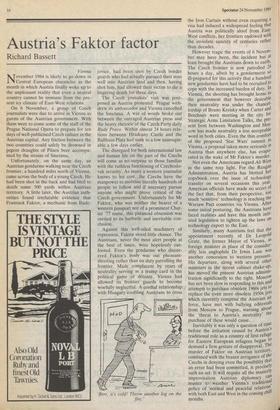Austria's Faktor factor
Richard Bassett
Vienna
November 1984 is likely to go down in Central European chronicles as the month in which Austria finally woke up to the unpleasant reality that even a neutral country cannot be immune from the pre- sent icy climate of East-West relations.
On 6 November, a group of Czech journalists were due to arrive in Vienna as guests of the Austrian government. With them were to come some of the staff of the Prague National Opera to prepare for ten days of well-publicised Czech culture in the Austrian capital. Any friction between the two countries could safely be drowned in pgtent draughts of Pilsen beer accompa- nied by the strains of Smetana.
Unfortunately, on the same day, an Austrian gendarme walking near the Czech frontier, a hundred miles north of Vienna, came across the body of a young Czech. He had been shot in the back and had bled to death some 500 yards within Austrian territory. A little later, the Austrian auth- orities found irrefutable evidence that Frantisek Faktor, a mechanic from Bude- jovice, had been shot by Czech border guards who had actually pursued their man well into Austrian land and then, having shot him, had allowed their victim to die a lingering death for three days.
The Czech jounalists' visit was post- poned as Austria protested. Prague with- drew its ambassador and Vienna cancelled the Smetana. A war of words broke out between the outraged Austrian press and the heavy rhetoric of the Czech Party daily Rude Pravo. Within almost 24 hours rela- tions between Hradcany Castle and the Ballhaus Platz had sunk to a low unimagin- able a few days earlier.
The disregard for both international law and human life on the part of the Czechs will come as no surprise to those familiar with the ruthless functioning of Czechoslo- vak security. As many a western journalist knows to his cost, the Czechs have the manpower to mobilise literally hundreds of people to follow and if necessary pursue anyone who might prove critical of the Czech government. Unfortunately for Mr Faktor, who was neither the bearer of a western passport nor of a prominent Char- ter '77 name, this paranoid obsession was carried to its barbaric and inevitable con- clusion.
Against this well-oiled machinery of repression, Faktor stood little chance. The Austrians, never the most alert people at the best of times, were hopelessly out- footed. Even the gendarme who discov- ered Faktor's body was out pheasant- shooting rather than on duty patrolling the frontier. Made complacent by years of neutrality serving as a trump card in the political game of détente, Vienna had allowed its frontier guards to become woefully neglectful. A cordial relationship with Hungary enabling Austrians to cross 'Brrr, its cold! Throw another log on the fire.' the Iron Curtain without even requiring a visa had induced a widespread feeling that Austria was politically aloof from East- West conflicts, her frontiers endowed with the inviolate sanctity of centuries rather than decades.
However tragic the events of 6 Novem- ber may have been, the incident has at least brought the Austrians down to earth. The Czech frontier is now patrolled 24 hours a day, albeit by a gendarmerie so ill-prepared for this activity that a hundred new gendarmes have had to be recruited to cope with the increased burden of duty. Iii Vienna, the shooting has brought home to the government that however desirable their neutrality was under the chancel- lorship of Bruno Kreisky when Carter and, Brezhnev were meeting in the city for Strategic Arms Limitation Talks, the pre- sent frost between Washington and Mos- cow has made neutrality a less acceptable word in both cities. Even the thin comfort of the proposed 'Star Wars' summit in Vienna, a proposal taken more seriously in Austria than anywhere else, has evapo- rated in the wake of Mr Faktor's murder.
Not even the Americans regard Alt Wien in the same rosy light. For the Reagan Administration, Austria has blotted her copybook over the issue of technology transfer on several occasions this year. American officials have made no secret of the fact that, from their perspective, too much 'sensitive' technology is reaching the Warsaw Pact countries via Vienna. After some initial posturing, the Austrians have faced realities and have this month initi- ated legislation to tighten up the laws on technology export to the East.
Similarly, many Austrians feel that the appointment recently of Dr Leopold Gratz, the former Mayor of Vienna, as foreign minister in place of the consider- ably less anglophile Dr Irwin Lanc was another concession to western pressure. His departure, along with several other ministers in the recent cabinet shake-up, has moved the present Austrian adminis- tration significantly to the right. Moscow has not been slow in responding to this and attempts to purchase obsolete 1960s jets to replace the even more obsolete 1950s jets which currently comprise the Austrian air force, have met with bullying editonals from Moscow to Prague, warning about the 'threat to Austria's neutrality' the purchase of these would cause. Inevitably it was only a question of tini,e before the irritation caused by Austria s traditional role as a country of first refuge for Eastern European refugees began to demand a firm gesture of disapproval. The murder of Faktor on Austrian territorY, combined with the brazen arrogance of the Czechs in denying even the possibility that an error had been committed, is preciselY such an act. It will require all the masterly improvisation Austrian diplomacy earl, muster to weather Vienna's traditiona: policy of 'normal and peaceful relations with both East and West in the coming chill months.






















































 Previous page
Previous page